

Queer Places:
Italia Conti Academy of Theatre Arts, 14 Lamb's Conduit St, London, Regno Unito
Lakeview Cemetery, N Main St, Upton, MA 01568, USA
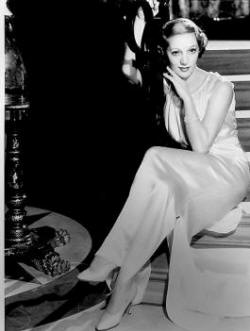 Gertrude Lawrence (4 July 1898 – 6 September 1952) was an English actress,
singer, dancer and musical comedy performer known for her stage appearances in
the West End of London and on Broadway in New York. She has been romantically
linked to Beatrice Lillie.
Noël Coward had
a number of lesbian and bisexual female friends and appeared in countless
double portraits with them, including
Gertrude Lawrence and Gladys Calthrop
displaying himself as part of a "creative duo". The movie Daphne, based on the
controversial central chapters in Margaret Forster's 1993 authorised biography
of
Daphne du Maurier, starred
Geraldine Somerville in the role of Du Maurier, and Elizabeth McGovern
and Janet McTeer as her two great romantic loves - the American
publishing tycoon's wife Ellen Doubleday and Gertrude Lawrence.
Gertrude Lawrence (4 July 1898 – 6 September 1952) was an English actress,
singer, dancer and musical comedy performer known for her stage appearances in
the West End of London and on Broadway in New York. She has been romantically
linked to Beatrice Lillie.
Noël Coward had
a number of lesbian and bisexual female friends and appeared in countless
double portraits with them, including
Gertrude Lawrence and Gladys Calthrop
displaying himself as part of a "creative duo". The movie Daphne, based on the
controversial central chapters in Margaret Forster's 1993 authorised biography
of
Daphne du Maurier, starred
Geraldine Somerville in the role of Du Maurier, and Elizabeth McGovern
and Janet McTeer as her two great romantic loves - the American
publishing tycoon's wife Ellen Doubleday and Gertrude Lawrence.
In 1948, Lawrence returned to Britain to star in September Tide, a play written specifically for her by Daphne du Maurier. Her role was that of a middle-aged Cornish woman whose son-in-law, a bohemian artist, falls in love with her. The playwright had intended her to open the play on Broadway, but Lawrence's husband thought it was too British for the American market. The London press paid little attention to her return to the stage, and she was distressed to discover that in a country struggling to recover from the effects of World War II, the public no longer was as interested in the private lives of stage stars as it once had been.[38] Prior to opening in the West End, the play toured Blackpool, Leeds, Liverpool and Manchester, where the frequently sparse audiences consisted primarily of elderly people who remembered Lawrence from her heyday. While on the road, she underwent erratic mood swings and frequently clashed with her fellow cast members, including actors Michael Gough and Bryan Forbes, and the crew.[39] The play opened in London in mid-December 1948.
Writing in Punch, Eric Keown called her return "an occasion for rejoicing" but dismissed the play as "an artificial piece of conventional sentiment which leaves the actress's talents unused." She remained with the play until July 1949, then returned to the United States, where she performed her role for one week at her husband's theatre in Dennis, Massachusetts.[40]
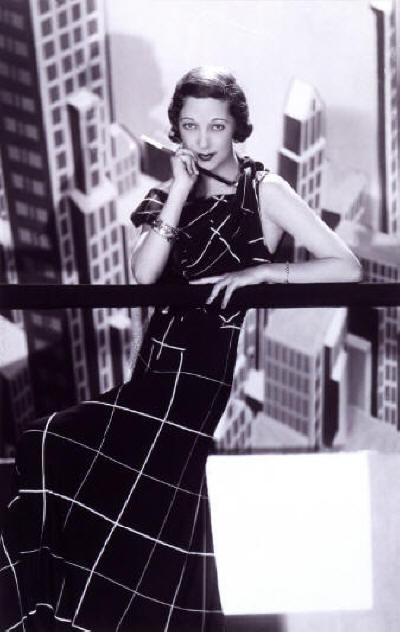
Gertrude Lawrence
by Paul Tanqueray
modern bromide print from original negative, 1932
12 3/4 in. x 9 in. (323 mm x 230 mm)
Photographs Collection
NPG x29700
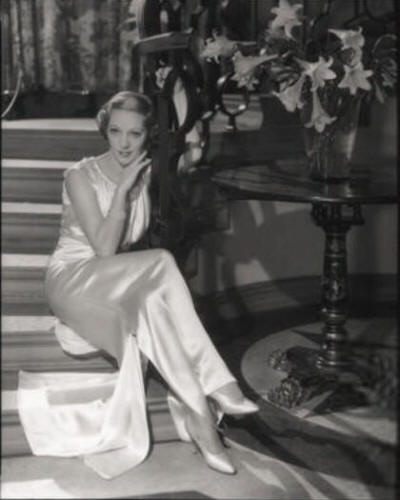
Gertrude Lawrence
by Francis Goodman
5 x 4 inch film negative, 1934
Photographs Collection
NPG x68807
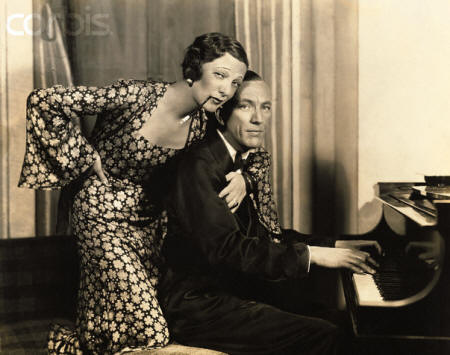
Gertrude Lawrence and Noel Coward in Private Lives
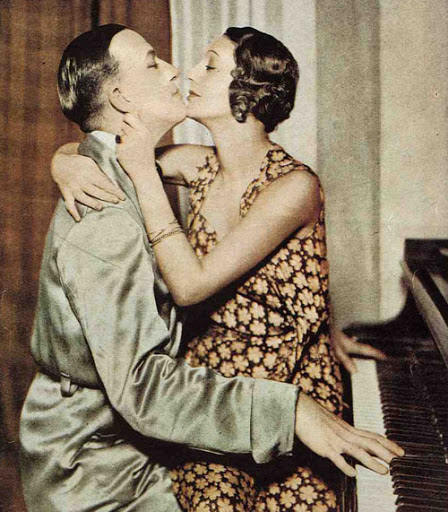
According to an authorised 1993 biography of the author and playwright by Margaret Forster, Lawrence and du Maurier became close friends during the London production of September Tide.[41] The nature of their relationship remained unclear following the 1989 death of du Maurier. Forster quotes du Maurier as saying the following about Lawrence c. 1949, "To be blatantly vulgar, anyone with a spice of imagination would prefer a divan with Gertrude to a double-bed with her."[41]
Lawrence biographer Sheridan Morley interviewed du Maurier for his 1981 book Gertrude Lawrence. Du Maurier was quoted as saying she called Lawrence by the nickname "Cinders," short for Cinderella. Either while negotiating to appear in September Tide or rehearsing it, Lawrence stayed in "a flat in London somewhere," according to what du Maurier told Morley decades later.[42] Boiling water in her tea kettle for a visitor was stressful for Lawrence.[42] Du Maurier also told the biographer that she had forgotten all the dialogue she had written for September Tide and that shortly before her interview with Morley she had "been searching my shelves for a copy of the play. ... I cannot remember how Cinders looked, what she wore, far less what she said."[42] Du Maurier's contribution to the Morley biography of Lawrence consists of little more than that.
Nothing about a personal connection between Gertrude Lawrence and Daphne du Maurier was published during Lawrence's lifetime. Two years after Lawrence's death, her widower Richard Aldrich had this to say in a best-selling biography of his late wife, Gertrude Lawrence as Mrs. A.:
All her ingenuous traits, which could be annoying as well as endearing, would be swept away by her courage, her clear perception of truth, and the divine compassion which could flood her heart and lift her to the heights of nobility.
I am sure that she was frequently bewildered by the rapidity and mutability of her own impulses. Possessed, as she was, of an intuitive rather than an analytical intelligence, I doubt that she really understood herself clearly, any more than did most of those who thought they knew her intimately. An exception in this regard was Daphne du Maurier.
During those months in England [when September Tide was in production], Gertrude and Daphne formed a warm friendship, which continued unbroken after Gertrude's return to America. Daphne later returned the visit by being Gertrude's guest in New York. Daphne's subsequent best-selling novel Mary Anne was originally planned as a possible starring vehicle for Gertrude.
It was chiefly from comments made later by Daphne that I was able to reconstruct the full picture of Gertrude's inner conflict during her stay in London. Daphne spoke of Gertrude's moodiness, her variability, her sense of vague self-dissatisfaction. To other English friends, Gertrude talked wistfully of wanting to remain in England, "where I belong."[43]
On 16 August 1952, Lawrence fainted backstage immediately after finishing a Saturday matinee of The King and I.[57] After "a few days at home," wrote her husband Richard Aldrich, she was admitted to New York-Presbyterian Hospital for tests.[57] Doctors said she was suffering from hepatitis, and she was admitted to a room on the 16th floor.[56] Her former son-in-law, Dr. William G. Cahan, recalled in his 1992 memoir (by then he was a globally recognised medical expert on cancer) what happened next in 1952:
She was admitted to New York Hospital [located across the street from the hospital where Cahan worked on the staff]. Her doctors were puzzled by what was described in the press as "a liver problem," and suspected that she might have cancer. Hearing this, and without Gertrude's knowledge, her husband consulted me. Not wanting to alarm her by appearing in person (she knew, of course, that by now I was a cancer specialist), I sent some of my colleagues as consultants. They, too, were puzzled, and ordered an exploratory laparotomy (abdominal operation).
At dawn of the day the operation was to take place [Saturday, September 6], Dick Aldrich called [Cahan on the telephone]: Gertrude had become comatose; would I please come to the hospital at once? I found her surrounded by interns frantically pumping intravenous fluids and stimulants into her. As I bent over her, she opened her eyes for a second or two, looked up at me, and made a face as if to say, "What are you doing here?"
A few minutes later, she died.
Concerned and curious about what had caused her death, I was present at her autopsy. This showed that she had widespread liver and abdominal cancer, the source of which was never clarified.[58]
According to the New York Times, 5,000 people crowded the intersection of East 55th Street and Fifth Avenue in Manhattan, while 1,800 others, including Yul Brynner, Connecticut Governor John Davis Lodge, Marlene Dietrich, Phil Silvers, Luise Rainer, Moss Hart and his wife Kitty Carlisle filled Fifth Avenue Presbyterian Church for Lawrence's funeral. In his eulogy, Oscar Hammerstein II quoted from an essay on death written by poet and novelist Rabindranath Tagore.[59] Lawrence was buried in the champagne-coloured gown worn for the "Shall We Dance?" number in the second act of The King and I, and she was interred in the Aldrich family plot in Lakeview Cemetery in Upton, Massachusetts.[60] She was the first person for whom the house lights were dimmed in all Broadway (Manhattan) theatres due to her death.[61]
My published books: